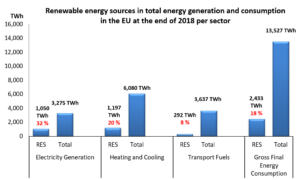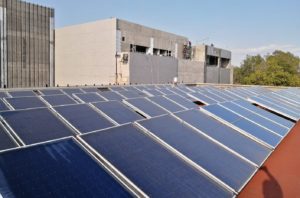Decarbonization – a winning card for industry
November 2, 2023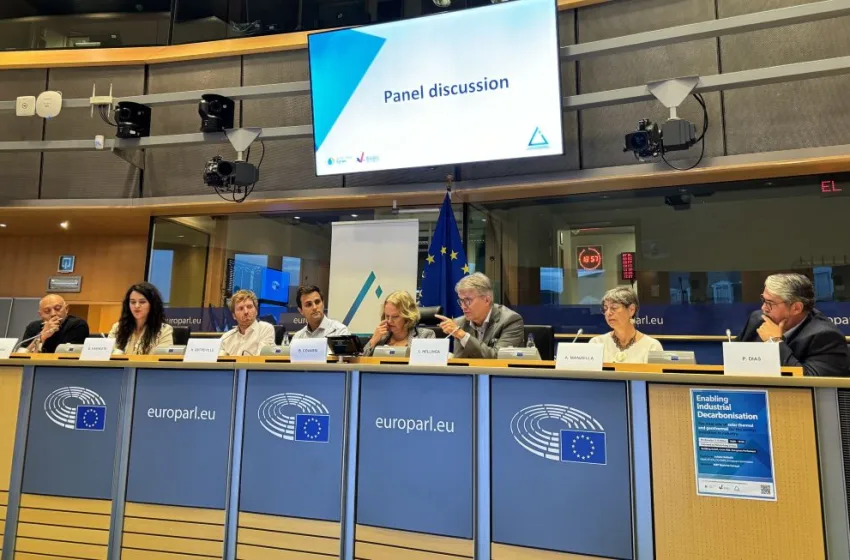
Decarbonization of heat in industry is now getting a lot more attention in Brussels. The Member of Parliament Beatrice Covassi together with Solar Heat Europe organized an event at the EU Parliament on 11 October under the title “Enabling industrial decarbonization”. The 10 MW solar industrial heat plant at malt producer Boortmalt in Southern France was one of two case studies presented during the two-hour event, which ended with networking drinks. Hugues Defreville, President of New Heat in France, and Gianni Vanneste, Group Energy Optimization Manager at Boortmalt in Belgium (third and fourth from left) together with Pedro Dias from Solar Heat Europe (first on the right) explained the importance of solar industrial heat during the panel discussion attended by around 90 participants.
Photo: Solar heat Europe
“This event has given us clear political signals from both the European Parliament and the European Commission that the heat agenda has been underestimated so far and needs to gain more visibility”, said Valérie Séjourné, Managing Director of Solar Heat Europe. “With a new Commission and Parliament coming up next year, which will need to work on the 2040 targets, our technology will gain further momentum, promotion and support, both at EU and local levels.”
Boortmalt is a suitable case study for green industrial heat solutions. The Belgian group operates 27 malt houses around the world and has far-reaching climate goals. It has been a member of the Science Base Target Initiative since 2021 and has committed itself to 50 % decarbonization by 2030. This goal has already been achieved at the factory in Issoudun, France. There, the outside air is first preheated by waste heat from the malt drying process and the exhaust fumes of the gas boilers to around 40 °C to dry the grains to produce malt. The air is then heated by the solar tank to the required 67°C. During the night and low-irradiation periods, backup energy for air heating comes partly from a biomass boiler.
Decarbonizing of heat in industry – the elephant in the room
“I am pleased that the elephant in the room – decarbonizing industrial heat – is finally being addressed on a European Level,” said Vanneste during his presentation. Boortmalt is basing its own 1.5 °C target on four pillars: solar thermal, geothermal, electrification of heat and district heating.
“We always opt for the most cost efficient decarbonization technology. When solar comes out of this analysis it is because of the high yields in good irradiation areas and cheap available land.” Possible solar sites that Boortmalt is looking at are mostly in Spain and Australia. One of the solar decarbonization projects is the engineering phase in Spain with a heat storage volume equivalent to 80 Olympic swimming pools, so that a solar fraction of 90 % of the factory’s heat demand is reached.
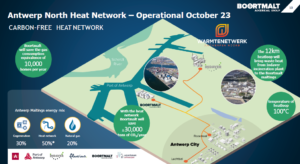
Scheme of Boortmalt´s decarbonization strategy in Antwerp in Belgium. Source: Boortmalt
The decarbonization of the Boortmalt factory near the port of Antwerp in Belgium will be based on connection to a heat loop. A 12 km heat-pipe system is under construction, which will bring waste heat from an incineration plant to the malting factory at temperatures of 100 °C. The waste heat will reduce the gas consumption of the Boortmalt factory by half. Operation start is planned for the end of this year.
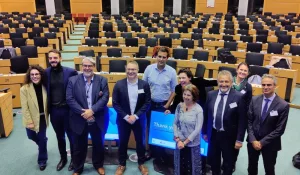
Very happy faces among the Solar Heat Europe team and the SHE members who supported the EU Parliament event on 11 October 2023. Planning for the event began already in autumn 2022 with a call from the Investment Industry Intergroup. Solar Heat Europe applied jointly with the European Geothermal Energy Council to submit a proposal showcasing flagship projects, which was approved in early March this year.
Photo: Solar Heat Europe
The event has sent a clear message to the European institutions that solar thermal is ready to scale up with strong investments into the European manufacturing base. “We do not want to subcontract the energy transition to China, so we need more support in terms of carbon pricing, lower subsidies on fossil fuels and binding renewable targets for industry and district heating players”, Guglielmo Cioni, President of Solar Heat Europe, made clear in his closing remarks.
Cioni also thanked Beatrice Covassi, Member of the European Parliament and Co-Chair of the Sustainable, Long-term Investments & Competitive European Industry Intergroup who hosted the event. She underlined that European industry should make sustainability its winning card.
Websites of organizations mentioned in this news article:
Sustainable, Long-term Investments & Competitive European Industry Intergroup: https://investmentindustryintergroup.eu/en/
Boortmalt: https://www.boortmalt.com/
New Heat: https://newheat.com/en/
Solar Heat Europe: https://www.solarheateurope.org/

